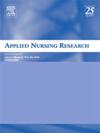Nurses' perceptions of care practices for adults with cognitive impairment in hospital: a cross-sectional study
IF 2.7
4区 医学
Q1 NURSING
引用次数: 0
Abstract
Aim
To explore nurses' perceptions of care practices for adults with cognitive impairment.
Design
A cross-sectional survey using an amended psychometrically tested tool. This cross-sectional study followed the STROBE guidelines.
Methods
A cross-sectional study was conducted with nurses working on select surgical and medical hospital wards in 9 hospitals across a regional health district in NSW, Australia. Participants (N = 235) completed a survey which collected relevant demographic information and explored their perceptions of care practices for adults with cognitive impairment. A five-point Likert scale was utilised in the survey, with a higher score indicating higher usage of the care practice. For data analysis, descriptive statistics explored perceptions and correlation analysis examined associations between participant demographics and perceptions.
Results
Nurses react with care (median = 3.75) when adults with cognitive impairment display challenging behaviours and most often use their professional knowledge (median = 4.00) as an alternative to physical restraints. The results of this study suggest that nurses' experience and recent education focused on adults with cognitive impairment significantly influenced care practices.
Conclusion
Years of experience as a nurse and recent workplace education may positively influence the nursing practice of adults with cognitive impairment. This paper supports the development of mentorship programs led by experienced nurses and the provision of workplace education to improve nursing care practice for adults with cognitive impairment in hospital.
护士对医院成人认知障碍护理实践的看法:一项横断面研究
目的探讨护士对认知障碍成人护理措施的看法。这项横断面研究遵循了 STROBE 指南。方法对澳大利亚新南威尔士州一个地区卫生区内 9 家医院外科和内科病房的护士进行了横断面研究。参与者(N = 235)完成了一项调查,该调查收集了相关的人口统计学信息,并探讨了他们对认知障碍成人护理实践的看法。调查采用李克特五点量表,得分越高,说明护理实践的使用率越高。结果当有认知障碍的成年人表现出挑战性行为时,护士会做出护理反应(中位数 = 3.75),并最常使用其专业知识(中位数 = 4.00)来替代物理约束。本研究结果表明,护士的工作经验和近期接受的以认知障碍成人为重点的教育对护理实践有很大影响。本文支持制定由经验丰富的护士领导的导师计划,并提供工作场所教育,以改善医院对认知障碍成人的护理实践。
本文章由计算机程序翻译,如有差异,请以英文原文为准。
求助全文
约1分钟内获得全文
求助全文
来源期刊

Applied Nursing Research
医学-护理
CiteScore
4.50
自引率
0.00%
发文量
65
审稿时长
70 days
期刊介绍:
Applied Nursing Research presents original, peer-reviewed research findings clearly and directly for clinical applications in all nursing specialties. Regular features include "Ask the Experts," research briefs, clinical methods, book reviews, news and announcements, and an editorial section. Applied Nursing Research covers such areas as pain management, patient education, discharge planning, nursing diagnosis, job stress in nursing, nursing influence on length of hospital stay, and nurse/physician collaboration.
 求助内容:
求助内容: 应助结果提醒方式:
应助结果提醒方式:


